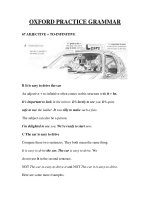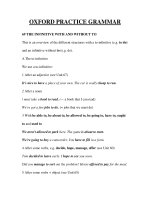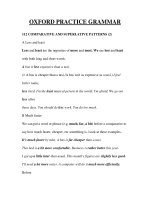Tài liệu OXFORD PRACTICE GRAMMAR 69 pdf
Bạn đang xem bản rút gọn của tài liệu. Xem và tải ngay bản đầy đủ của tài liệu tại đây (83.09 KB, 5 trang )
OXFORD PRACTICE GRAMMAR
69 THE INFINITIVE WITH AND WITHOUT TO
This is an overview of the different structures with a to-infinitive (e.g. to do)
and an infinitive without to (e.g. do).
A The to-infinitive
We use a to-infinitive:
1 After an adjective (see Unit 67)
It's nice to have a place of your own. The car is really cheap to run.
2 After a noun
/ must take a book to read. (— a book that I can read)
We've got a few jobs to do. (= jobs that we must do)
3 With be able to, be about to, be allowed to, be going to, have to, ought
to and used to
We aren't allowed to park here. The game is about to start.
We're going to buy a camcorder. You have to fill in a form.
4 After some verbs, e.g. decide, hope, manage, offer (see Unit 60)
Tom decided to leave early. I hope to see you soon.
Did you manage to sort out the problem? Henry offered to pay for the meal.
5 After some verbs + object (see Unit 65)
Laura persuaded Trevor to put up some shelves.
I want you to do something for me.
6 After for + object (see Unit 68)
We've arranged for you to visit our head office.
It is important for students to register with a doctor.
7 After a question word (see Unit 66)
We don't know where to leave our coats.
This book tells you how to train race horses.
8 To say why (see Unit 151B)
Mark went out to play golf. I need the money to pay the phone bill.
B The infinitive without to
We use an infinitive without to:
1 After can, could, may, might, must, needn't, shall, should, will, and
would
We could go to a night club. I must speak to the manager. It
might rain later. Sarah will be away for three days.
2 After had better and would rather
It's cold. You'd better wear a coat. I'd rather listen to Elvis than the Beatles.
3 After make + object and let + object
That programme was funny. It really made me laugh.
Trevor will be here at five. His boss is going to let him leave work early.
4 After see or hear + an object (see Unit 74)
They saw the lights come on. We all heard the bomb go off.
C Help
An infinitive after help can be with or without to.
Can I help (to) get the tea? Vicky helped me (to) choose a present.
69 EXERCISES
1 The to-infinitive (A)
Comment on these situations. Join each pair of sentences using a to-
infinitive. ►
Mike will give you a lift. He promised. You: Mike promised to give me a
lift.
1 You want to eat. You must have something.
You: I must .....................................................................................................
2 You are having a rest. It's nice.
You:
It's…………………………………………………………………………...
3 Will Rita speak to Nick? He wants her to.
Nick…………………………………………………………………………
……
4 Daniel can't repair the video. He doesn't know how to.
5 Claire and her sister are going to Bali. They have decided.
6 Melanie is visiting David. She has gone to the hospital.
7 Vicky is doing some studying. Unfortunately she has to.
8 Sarah must ring the office. It's important.
2 The infinitive without to (B)
Put in the missing verbs. Usually more than one answer is correct.
► I've been repairing the car. I really must wash my hands.
1 What's in the letter? Why won't you let me .................it?
2 Did you see that lovely old car ................ past a moment ago?
3 It was a terribly sad story. It made me..................
4 I don't want to do anything energetic. I'd rather................. on the beach.
5 It's very cold. I think it might................ for the first time this winter.
6 I keep getting this pain in my leg. I think I'd better ................. a doctor.
3 The infinitive with and without to (A-B)
Matthew and Emma are at the railway station. Emma is going away for the
weekend. Put
in the infinitive of the verbs. You have to decide whether or not you need to.
Matthew:
Are you sure you'll (►) be (be) all right?
Emma: Yes, of course. I'm not a child. I can manage (►) to look (look) after
myself.
Matthew: OK, sorry.
Emma: Some friends have invited me (1)........................(visit) them. I'm not
going to the North Pole.
Matthew: It'll be nice for you (2) ...................... (see) your old friends again.
I just know you're
going (3)....................... (have) lots of fun. Let me (4) ........................ (buy)
you a magazine
(5)....................... (read) on the train.
Emma: I can't (6)....................... (read) when I'm travelling. It makes me
(7).........................(feel)
sick, even in a train. I'd rather just (8) .......................(look) out of the
window.
Matthew: OK. Well, you'd better (9) ....................... (get) in. I think it's about
(10).........................(leave).
Oh, did I remind you (11).......................(change) at York?
Emma: Yes, Matthew, you did. Don't worry, I won't (12)
........................(forget). I know perfectly well
how (13).......................(get) there.









